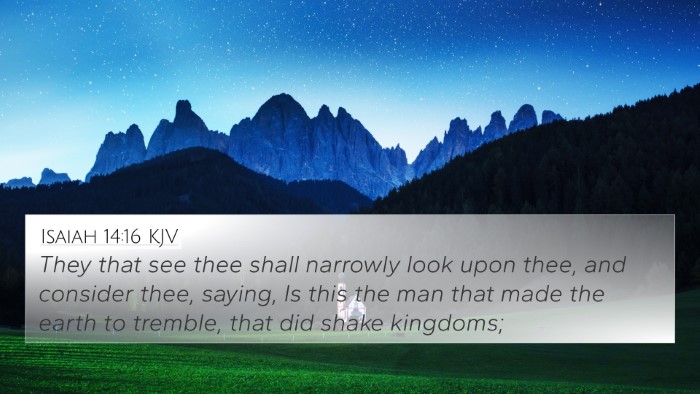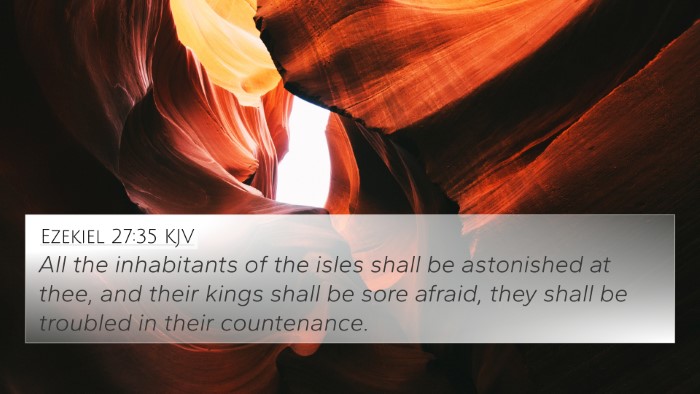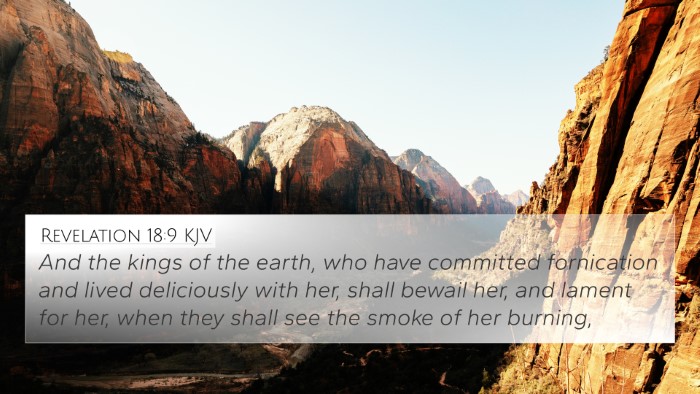Ezekiel 28:19 - Summary and Interpretation
Ezekiel 28:19 states: "All who know you among the peoples are appalled at you; you have become a horror, and you shall be no more forever." This verse captures the downfall of the King of Tyre, often interpreted as a representation of the ultimate consequences of pride and rebellion against God.
Meaning and Insights
This verse serves as a stark warning about the fate of those who oppose the divine order. The commentaries of Matthew Henry, Albert Barnes, and Adam Clarke provide profound insights into the meaning of this passage:
-
Matthew Henry:
Henry emphasizes the deep humiliation that comes from pride. He explains that nations and people once admired the King of Tyre, but due to his arrogance and opposition to God, he ultimately faced despair and desolation. This verse embodies the principle that those who exalt themselves will be brought low.
-
Albert Barnes:
Barnes stresses that the "horror" of the King’s fall serves as a message to all nations. He interprets this as more than a historical account but a timeless truth about the destiny of the unrighteous and prideful. The stark declaration that he "shall be no more forever" signals the finality of God’s judgment.
-
Adam Clarke:
Clarke points out the comprehensive nature of the statement regarding the King of Tyre’s end. He explains that this verse encapsulates the fate of all who align against God’s will, reinforcing the idea that divine justice prevails.
Bible Cross-References
This verse is linked to various Biblical texts across both the Old and New Testaments, creating meaningful connections that enhance understanding:
- Isaiah 14:12-15: This passage also addresses the fall of a proud individual, often interpreted as a reference to Lucifer. Both texts explore themes of pride leading to downfall.
- Proverbs 16:18: "Pride goes before destruction, and a haughty spirit before a fall." This connects with the central theme of Ezekiel 28:19 regarding the repercussions of pride.
- Matthew 18:4: "Whoever humbles himself like this child is the greatest in the kingdom of heaven." This verse reinforces the value of humility as opposed to pride.
- Revelation 20:10: The ultimate defeat of Satan is foreshadowed here, paralleling the judgment of the King of Tyre.
- Jeremiah 49:16: This verse warns against pride, similar to Ezekiel, as it portrays a desolation that follows prideful actions.
- James 4:6: "God opposes the proud but gives grace to the humble," directly echoing the sentiments found in Ezekiel regarding pride's consequences.
- Romans 12:3: “For I say, through the grace given to me, to everyone who is among you, not to think of himself more highly than he ought to think.” This reinforces the teachings of humility over pride.
Thematic Connections and Interpretations
The verse not only serves as a historical account but also carries theological implications that are applicable across various contexts:
- The Consequences of Pride: As seen through cross-references, pride consistently leads to destruction, illustrating a universal principle found in Biblical teachings.
- God’s Sovereignty: The fall of proud rulers and their ultimate demise underscore God’s control over earthly kingdoms and the destiny of individuals who oppose Him.
- Judgment and Restoration: While the verse highlights judgment, the overarching narrative of Scripture points towards restoration for those who turn back to God.
Tools for Bible Cross-Referencing
Engaging with this verse and its connections involves utilizing various resources:
- Bible Concordance: A tool that helps locate words and phrases throughout the Bible, perfect for identifying connections.
- Cross-Reference Bible Study: Engaging in systematic study to uncover how different verses inform one another.
- Bible Cross-Reference Guide: Using guides that outline relationships between scripture passages enhances understanding.
- Bible Reference Resources: Several online and print resources can aid in deeper study, making connections easier to track.
Conclusion
Ezekiel 28:19 invites deeper reflection on the nature of pride, the sovereignty of God, and the eventual judgment that awaits those who defy Him. By exploring this passage alongside its cross-references, readers can gain a comprehensive understanding of biblical themes that continue to resonate today. Using established tools and methodologies for cross-referencing enriches one’s engagement with Scripture and fosters a more profound theological insight.











